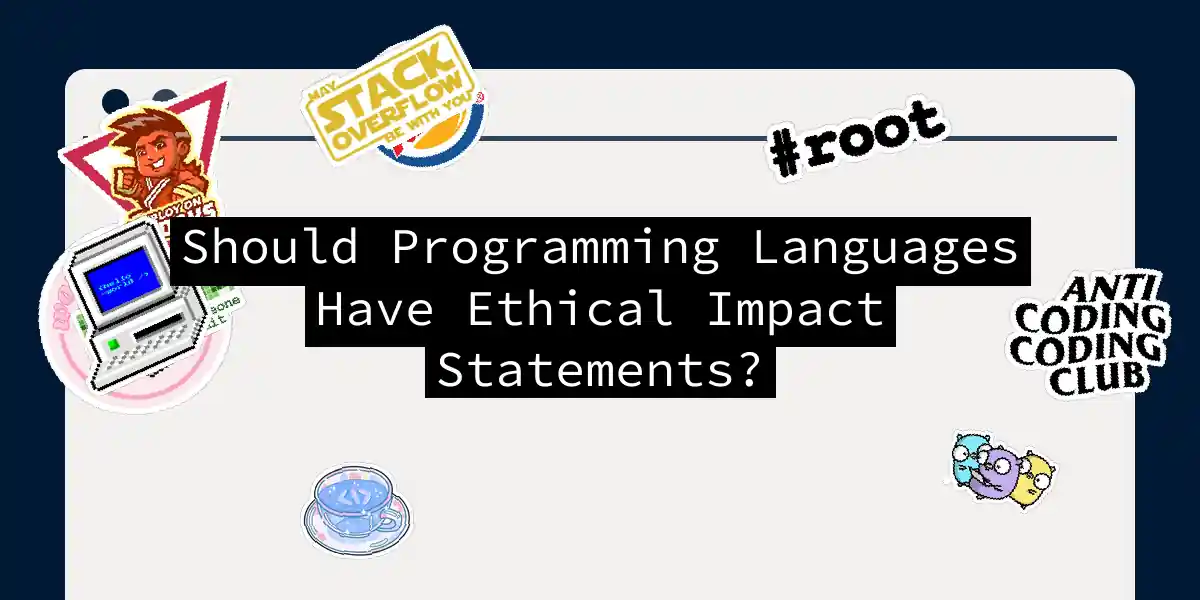Do programmers need a “moral compiler” that flags unethical code? Imagine this scenario: You’re trying to write a recommendation engine, and your IDE suddenly highlights a line in red, saying, “Potential for algorithmic bias detected.” That’s essentially what ethical impact statements could enforce. Let’s explore this radical idea through three lenses: existing ethical frameworks in tech, technical implementation strategies, and real-world examples where such statements could have changed the game.
Would the Hippocratic Oath Work for Code?
Medical professionals have their “do no harm” oath. Software engineers? Not so much. The Association for Computing Machinery (ACM) has guidelines that sound like a developer’s version of medical ethics:
- Minimize Harm: “Avoid harm to others through your code” (ACM Code of Ethics)
- Transparency: “Be honest and trustworthy”
- Social Responsibility: “Contribute to society and human well-being” But these are voluntary. Enforcing them would require something more concrete than a checkbox for “I agree to the terms.”
def responsible_ai_deployment():
# Ethical compliance layer
if not check_privacy_compliance():
raise EthicalViolation("Data handling policy breach")
if not audit_for_bias():
raise EthicalViolation("Systemic unfairness detected")
return deploy_model()
class EthicalGuard:
def __init__(self, model):
self.model = model
self._register_checks()
def _register_checks(self):
# Register ethical compliance checks here
# e.g., compliance with GDPR, CCPA, etc.
The Tech Industry’s Dirty Little Secret: We Already Do This
Mental health apps like Crisis Text Line faced backlash for sharing sensitive data. Imagine if developers had ethical impact statements guiding their development:
- Data Handling: “This app will never share crisis-related data without explicit consent”
- Bias Audits: “All recommendation algorithms will undergo regular bias tests”
- Transparency: “Full data usage disclosure in plain language” The FTC’s concerns about surveillance tech (as reported by CDT) highlight how existing laws struggle to keep up with tech’s ethical dilemmas.
Implementing Ethical Safeguards: A Developer’s Guide
- Ethical Linting Tools: Add rules to your code formatter
- Compliance Annotations: Document ethical considerations
- Automated Audits: Integrate bias detection into CI/CD
# Example: Bias detection pipeline
def train_model_with_ethics():
data = load_sensitive_dataset()
bias_audit = BiasAnalysis(data)
if bias_audit.showing_disproportionate_impact():
raise EthicalViolation("Training paused due to ethical concerns")
return deploy_model()
The Dark Side: When Ethics Clash with Implementation
What happens when “being ethical” conflicts with business goals? The ACM’s guidelines sound noble, but real-world economics often win. For example: | Scenario | Ethical Approach | Real-World Outcome | |||-| | Aggressive data collection | Minimize user tracking | “Opt-out” buried in TOS | | Algorithmic decision-making | Full transparency | Black-box systems remain | The recent FTC debates about commercial surveillance practices show how hard it is to balance innovation with responsible design. Mental health apps that exploit user vulnerabilities are Exhibit A.
A Possible Future: Ethical Language Specifications
Imagine a future where languages have built-in ethical safeguards:
// Rust-like syntax for ethical assertions
fn calculate_credit_score(input: Data) -> Result<i32, EthicalError> {
assert Bias::none(input);
assert Privacy::protected(input);
// Then calculate score
...
}
This would require:
- Clear Ethical Policies: Community-defined standards
- Runtime Checks: Verified by compiler
- Audit Trails: Tracking ethical compliance But let’s not kid ourselves – this is still a pipe dream. The environmental impact of modern AI (mentioned in IEEE’s considerations) shows how complex these issues are.
The Developer’s Dilemma: Balancing Speed and Ethics
Developers face a cruel irony: We’re judged on delivery speed but blamed for ethical failures. The Knight Capital trading disaster (mentioned by Uncle Bob) proves how catastrophic untested code can be. Do we need similar standards for ethics? Yes, but with a different approach. Instead of one-size-fits-all regulations, we need:
- Domain-Specific Standards: Mental health apps vs ad tech have different ethical requirements
- Continuous Ethics Reviews: Like security audits but for societal impact
- Transparency Mandates: Publicly document ethical choices
Conclusion: The Answer Lies in Our Codebases
Should programming languages enforce ethics? Not directly. But developers should demand tools that:
- Highlight Ethical Risks: Like security vulnerabilities
- Provide Mitigation Strategies: Automatically suggest safer alternatives
- Document Ethical Choices: In code comments and architecture diagrams As AI’s power grows (GenAI, LLMs, etc.), the need for ethical guardrails becomes urgent. Developers must become “ethical architects” who consider societal impact in every design decision. Final Thought: The future of software development isn’t about writing perfect code – it’s about writing code that deserves to exist in the world. Let’s make sure our IDEs start asking the right questions.
